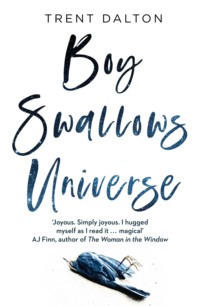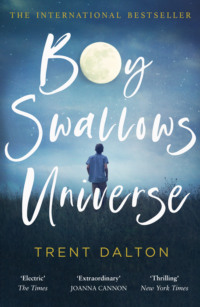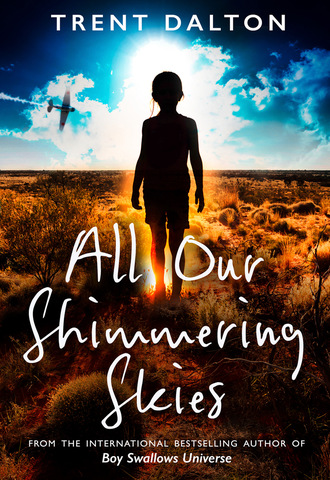
Полная версия
All Our Shimmering Skies
Molly looks up at her uncle, who is still holding her grandfather’s pan when he turns his back on Molly and looks back down into the grave. Molly stands and wipes her face with her yard dress and she spits half a mouthful of blood on the dirt and then she runs fast at her uncle and she drives her shoulder hard into his back and she pushes against him with her legs. She will send him to hell where he belongs and the quickest route she can see is through that endless black void.
But her uncle doesn’t move. His bones are too hard from digging. His bones are too hard from living. ‘This is your grave!’ Molly screams, pushing with all her strength as her bare toes slip in the soil beneath them. ‘This is yoourrr grave!’
Then she gives up pushing against her uncle and reaches for the pan he holds in his right hand. ‘This is mine,’ she screams. ‘Give it back.’ She tugs on the pan and pulls back on it with all her strength and all that is left of her will. ‘Give it back.’
Aubrey Hook is still gripping the pan when he turns and smiles at his niece as though he’s going to enjoy the thing he’s about to do, and the gravedigger girl is still bulldog-clinging to the pan when her uncle swings his right arm with such fury and power that Molly’s feet are lifted from the earth and she is thrown through the air and the only thing that stops her wild forward motion is the impact of her left temple meeting the edge of the large black rock frog rock next to the grave. Then she might as well be the one who is falling through that endless void towards hell because everything in her world, even the day sky, has turned to black.
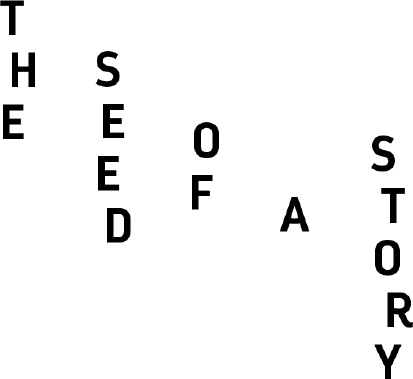
A black flying fox in the predawn pink of a wet season sky. Gravity turns the fruit bat’s faeces into a teardrop falling fast to the earth and inside that teardrop is a single seed. Wind pushes the teardrop towards a eucalypt woodland with a vast understorey layer of vibrant green spear grass. The teardrop falls hard and finds its own permanently moist pocket of earth. The sun rises and falls in the sky and rises and falls in the sky and the black flying foxes of the Northern Territory fly east and west with and towards their kin.
Wet seasons turn to dry seasons and turn to wet again, and suns make way for moons and then a tree grows out of a pocket of moist earth where once a fruit bat’s seed found a home. It has rough dark-grey bark, stands thirty feet high and has glossy, round leaves that bounce light like the inside of an oyster shell. And from among these leaves, on the morning of 7 December 1941, a small round fruit appears before the world. It is the colour red and it is ribbed all around. It is a red bush apple.
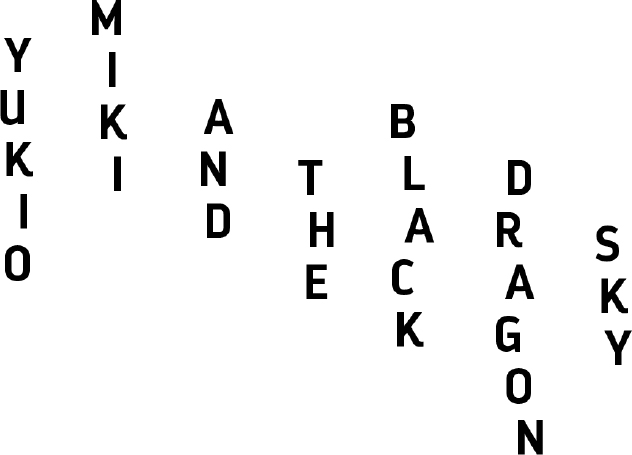
His gloved hand reaches for her photograph in the grey blindness of a cloud. ‘Nara, make me strong,’ he whispers. The photograph is fading, stuck by gum above the circular fuel gauge of Yukio Miki’s Mitsubishi A6M ‘Zero’ long-range fighter. The original photograph was wider: Nara Nui kneeling on the floor beside the right leg of her father, Koga Nui, who was seated on a wooden chair, his right palm resting on his right thigh and his left hand concealed by the long sleeve of his hemp and silk kimono – his winter kimono – patterned with pine trees that Yukio always considered a fair pictorial representation of Koga Nui’s existence: towering and bristling and hard to kill with anything but an axe.
Yukio sliced the photograph in half, weeks ago, with his pocket knife pressed against an aircraft carrier mess hall table in Hitokappu Bay, in the Kuril Islands, leaving only Nara to grace the sacred gum space above his fuel gauge. Nara’s not looking at the camera in the photograph, and she told Yukio she was looking, in fact, at her nine-year-old niece, Soma, who was walking precariously behind the camera on a pair of empty soup tins tied with rope. It was Soma who was making Nara smile so wide, she said, but Yukio knew the truth, that it was life that gave Nara Nui her smile; it was children and snow and harlequin ducks bobbing along clearwater streams and it was fat fish hanging from her hook and it was a red paper kite stolen by the wind and carried across southern Osaka; it was the air and the sea and the sky that formed that smile. Nara wears her one and only kimono in the photograph, patterned with plum blossoms, winter cousin of sakura – cherry blossom. The plum blossoms always bloomed in time for the cold days when Nara would nestle into the soft cushion of flesh between Yukio’s right breast and right shoulder. He would feel her lips moving on his chest as she spoke of their love and their future, and all he saw as he lay with his back on the snow-flaked grass were the gold hearts of hanging white plum blossom flowers against a sky as grey as the cloud he flies through now. It felt, then, like Nara was talking to his chest on purpose and when she whispered ‘zutto’ – eternally – she really was meaning to say it up so close; she meant to say it directly to his fast-beating heart.
There is a parachute pack stuffed behind his seat. Few Zero pilots carry parachutes. He could slip his on here now in the cloud, he tells himself. The Zero’s cockpit can’t be jettisoned but it can be opened in flight. He could exit here, slip away unseen by his brothers and feel no shame. The high winds of the Pacific would carry him to a tropical island, carry him to Egypt, to Paris, to London with its big round yellow ticking clock in the night sky. A strong enough updraught could lift him and his parachute up through the clouds, even, through the sky and the stars and into Takamanohara, the Plain of High Heaven.
No, he tells himself. A Zero samurai fights to the death. Death, he tells himself. Death. The only answer to every question he ever asked about life. The shortest route to heaven. The quickest road to Nara.
*
The shortsword that rattles against metal in the left-side gap between the Zero’s pilot seat and cockpit door is called a wakizashi. The shortsword’s blade is only thirty centimetres long. Wakizashi swords were traditionally made for close-quarter fighting or to commit seppuku, ritual suicide, but Yukio carries the sword today not for the sharpness of its blade but for the power of the object’s story. A gift from father to son. A sword more than two centuries old, passed through the hands of Miki men, all of whom, with the exception of Yukio the fighter pilot, worked in the artisan knife-making workshops of old town Sakai, on the edge of Osaka Bay, at the mouth of Yamato River.
There is an image of a butterfly engraved on the handle end of the sword’s blade. The blade was forged in the Miki family workshop in the heart of Sakai, a bustling fishing port and one of Japan’s busiest and oldest foreign trading hubs, filled with the sacred air of maritime commerce and tuna blood and the guts of fat red queen crabs. It was in the same modest and small and well-kept laneway knife-making workshop that Yukio’s father, Oshiro Miki, passed the wakizashi to his first-born son, then aged in his mid-twenties, on the day he left Sakai to join his military brethren in the selective and punishing Imperial Japanese Navy Air Service pilot training programme. Oshiro had told his son the story of the sword’s creation many times but on this day of sad departures he felt he needed to tell him again.
‘No more stories, father,’ Yukio pleaded. He had grown tired of his father’s stories. As a boy, Yukio had lived for his father’s tales. Tales of how the Miki family had been making blades for six hundred years. Tales of samurai swords forged for great warriors. Tales of how the flames of feudal war were finally extinguished and the need for samurai swords was blown away with the ashes of the dead, and how the Miki family elders then turned their sword-making skills to creating the sharpest fishermen’s filleting knives in all of Sakai. Knives forged for cutting the heads off tuna that could still carve through the neck bones of any fisherman foolish enough to doubt the integrity of Miki family steel.
Yukio would sit for hours behind the workshop counter on an upturned wooden wash bucket, polishing and sharpening filleting blades as he watched his father dazzle fishermen with increasingly elaborate tales of each sold knife’s mythic creation. Fishermen from the Black Sea and from the Mediterranean and the Pacific and the Atlantic, and from seas as high and cold as the world went, and as wide and warm. They would come to Sakai port to hear Oshiro Miki tell his knife-maker tales. And, every single week, young Yukio was surprised to find that his father had miraculously acquired a new sacred and old blade that he had promised never to part with but might consider selling to one lucky foreign fisherman if he deemed him worthy of the knife’s ownership.
‘You carry yourself with honour,’ Oshiro would say to that week’s particularly fortunate customer. ‘You have treated my family and me with respect, and for this kindness I will repay you by showing you a most uncommon blade. I will now tell you the story of this blade, but you must never repeat it and you must never speak of where you found this blade.’
What followed was usually a tale of adventure, courage, sacrifice, tragedy and, always, true love. The blade Yukio’s father held in his hands was invariably the sacred object with which the tragic hero of each story managed to overcome a malevolent force – deceitful loved one, old wizard, seductive witch, many-limbed sea monster – standing in the way of true love’s triumph. Oshiro would complete these lucrative counter transactions and then turn to his son and whisper about the wonders and importance of story. ‘The finest blades are forged not with steel, son,’ he would say. ‘But with story.’ Oshiro Miki knew full well that his customers would speak freely of where they found their precious new blades. He knew his strict requests to keep his hallowed workshop and its treasured stories secret was the very reason Miki family blades were spoken about over tuna nets and chopping boards across the globe.
As Yukio grew into his teens behind the workshop counter, his father taught him how to tell these knife stories to foreign travellers in broken English and broken French and broken Spanish. The stories, he said, could sound even more mystical and significant when told in a few carefully selected English words.
‘Love!’ Oshiro hollered in perfect English to a wealthy American couple sailing the seven seas, oil money spilling from their pockets. He waved his hands excitedly at the long-married husband and wife. ‘I see … love!’ he declared. And then he explained in broken English that the word ‘love’ was his favourite word in the entire English language because it was the first word of English he ever learned. How perfect, Oshiro recognised, and how fortunate was he that the first word of English he ever learned was also the language’s most profound and sacred and joyous. ‘True … love,’ he said with a smile.
And Yukio watched as the Americans smiled with the newfound knowledge that their shared love, despite whatever feelings they may have harboured to the contrary, was clear and strong enough to cross even the divides of sea and language. Then Yukio’s father spoke of how that couple’s true love reminded him of a true-love story behind a sacred and expensive wakizashi that he just knew would make the perfect souvenir to show their many friends back home in Pennsylvania.
‘Was “love” the first word of English my father learned?’ Yukio asked his grandfather Saburo Miki, who was an old and quiet and thoughtful man, as they washed dishes that night.
‘Ha!’ Saburo laughed. ‘The first word of English your father learned was “dog”. The second word he learned was “fish”.’
‘Then my father is a liar,’ Yukio said.
‘Your father is a storyteller,’ Saburo said, washing thick brown fish sauce off a dinner plate. ‘He tells those stories to fill this plate for you each night. There is a difference between liars and storytellers, Yukio.’ The grandfather passed the clean dinner plate to his grandson. ‘Some storytellers still make it to heaven.’
*
‘Just one more story,’ Oshiro Miki said, holding the wakizashi in two hands before his son. He prefaced this story as he’d done every other time he told it, by acknowledging its more questionable narrative turns. ‘For this story to reach your heart, son, you may need to swallow it down with a sprinkling of salt from the shores of the inland sea,’ Oshiro said. ‘You should write the facts of this story only on tissue paper. But you should carve its meaning in stone.’
Yukio patiently and respectfully listened, again, as his father spoke of how the shortsword was made in the 1700s by a quietly spoken and diligent knife-maker named Asato Miki, who had discovered that the love of his life, Rina, had left Sakai in the arms of his younger brother, Uno. All but swallowed up by the dark shadow of grief and betrayal, Asato Miki willed himself to forge the perfect wakizashi blade, with which he was determined to cut out his own beating heart and toss it into the furnace that had forged his own murder weapon. For such an impossible act, Asato reasoned, he would need to forge an impossible blade and, in a single, dizzying twenty-four-hour haze of fevered and hate-filled industry, Asato hammered two types of metal together – soft and workable jigane iron and hard and deadly tamahagane steel – in a furnace so hot he could only work in thirty-minute blasts of furious activity between guzzles of fresh water fetched by his apprentice, which would also serve to cool and harden the blade. Asato felt so strong that day that he came to believe the very breath of Futsunushi – god of swords – had filled his workshop and a dragon’s fire had filled his blood. Asato forged the two metals into a single blade so sharp it cut the four legs off the bed he had shared for three years with Rina in four swift strokes.
The tortured ironworker was stunned by a newfound artistry born of pain. He was more stunned, still, to discover that the joy of his newfound gifts had swallowed up the sorrow that had driven him to make the sword in the first place. Asato began demonstrating and advertising his miraculous ironwork skills in sake houses across Sakai by having loose-pocketed drinkers throw objects – apples, oranges, carrots, potatoes, unlucky alehouse kitchen rats – at him, each of which he would slice into two perfect halves with a single swipe of a short but swift sword as thin as a Yamato River ghost.
One day a legendary vagabond assassin known as the ‘White Tiger’ sailed into the Sakai port, his thick mane of pure white hair braided and hanging almost to his calves. He began asking questions about an impossible blade forged by love and betrayal and loss and hate.
‘That sword is not for sale,’ Asato told the stranger in his workshop.
‘What if I told you the first person I will kill with this blade will be your betrayer, Rina?’ the White Tiger asked. ‘And what if I told you the second person I will kill with this blade will be your younger brother, Uno?’
Asato was silent for a moment. ‘The sword is not for sale,’ he said.
The White Tiger reached into a leather pouch slung to a belt around his waist. He raised a closed fist then opened it to reveal a pure white butterfly, which launched into flight from the assassin’s soft, open palm.
‘Have you heard the story of the gravedigger and the butterfly?’ the assassin asked.
‘I have not,’ said Asato.
*
And so now Oshiro Miki told his story of how the White Tiger told his story of Takahama, who was born into wealth and was highly educated but, despite his good fortune, chose, in the prime of his life, to spend the rest of his days alone, digging graves and tending the headstones of the dead, as caretaker for what was believed to be the most haunted cemetery in all of old Japan. So humble was the caretaker’s hut connected to the cemetery grounds that Takahama’s wealthy and influential family refused to visit for fear of embarrassment. Years later, when two neighbouring villagers stumbled upon an aged Takahama slowly dying alone on his bed, they called for the cemetery keeper’s remaining relatives to visit him at once.
Takahama’s long-lost nephew, Hansuke, made it to the old man’s bed just in time to witness his final hours of life. As Takahama drew his last laboured breaths, a pure white butterfly flew in through his window and perched itself peacefully on the tip of his nose. The butterfly flapped its wings once, twice, three times. Hansuke shooed the butterfly away, and it flew off and returned and flew off and returned to the tip of the old man’s nose. Then Takahama’s eyes closed forever and the white butterfly seemed to know this and flew back out the window. Instinctively, Hansuke followed it deep into the haunted cemetery. He ran through grey and black gravestones covered in weed and moss, aisle upon aisle of the never-visited dead. The white butterfly flew left and flew right and then deep into a tunnel of elm trees that ended at a single tomb, where the butterfly rested itself on the only grave in the cemetery without a trace of moss or dirt upon it. Indeed, the grave was as pristine as if the headstone and tomb had been placed that very day. There was a name on the headstone: ‘Akiko’.
Studying the gravestone epitaph, Hansuke began to piece together the story behind his late uncle’s decisions. Akiko and Takahama had been betrothed, but Akiko had died the day before their wedding. Since Takahama had already promised to look after his beloved Akiko, every hour of every day, he swore he would continue to do that, even if it meant caring only for her grave.
As he stood pondering this, Hansuke noticed another small white butterfly emerge from the dense forest surrounding the cemetery and flutter towards the one he had followed to the grave, which was still hovering above the headstone. The two white butterflies circled each other for a long moment and then Hansuke edged closer to them, but his movement caused the butterflies to fly away from the headstone and they fluttered up into the sky and never came back down again. The nephew stared at that blue sky above, not with a sense of grief or confusion, but only wonder.
Asato Miki stroked his chin inside his knife-making workshop, absorbing the assassin’s tale.
‘Well?’ the assassin asked.
‘Well what?’ Asato replied.
‘What did you learn from the story?’ the assassin asked.
Asato stroked his chin some more, then gave his answer. ‘It is a simple tale you tell and there is only one lesson to be learned from it,’ he said. ‘Transformation. Sometimes they stay with us. And sometimes they wait for us. The lost are not lost. We can change into things. We can transform ourselves. Sometimes for the better …’
‘Sometimes for the worse,’ said the assassin, his eyes turning to the pure white butterfly that was now flapping above his right shoulder. He turned back to Asato. ‘I must take your life now,’ he said.
‘Why?’ Asato asked.
‘Because you will not share your artistry with me.’
‘You haven’t given me a chance,’ Asato said.
The assassin paused. ‘Very well,’ he said. ‘Show me the full extent of your artistry.’
‘How would I do that?’ Asato replied.
The assassin turned his eyes to the butterfly. ‘Take your sword and slice a wing off this flying white butterfly.’
‘That’s impossible,’ Asato said.
‘So is your blade,’ the assassin said.
Asato took a deep breath then exhaled slowly. He retrieved his impossible sword from a small locked room off the workshop’s furnace area and returned to stand before the butterfly and the assassin. He gripped the sword’s handle tight and raised the perfect blade high as the butterfly hovered, as if by will, as if by command, before his eyes. The betrayed sword-maker drew a short breath, tensed his shoulders, fixed his feet to the floor and began to swing his blade – but he immediately pulled out of the swing, and presented the sword to the assassin, handle end first. ‘I can’t,’ he said, shaking his head.
The assassin raised his eyebrows.
‘The butterfly’s life is already too short,’ Asato said.
The assassin lifted the sword to his eyes, laid his forefinger gently on the blade. He turned to face Asato and swung the blade three times. The sound of steel slicing through air was the only evidence of his actions, the blade moving too fast to be visible. Asato heaved a long sigh of relief on realising that he was still breathing.
The White Tiger rested the sword in his open palms then handed it back to its creator. ‘You are right, knife-maker,’ he said, before turning and exiting the workshop through its rusty-hinged wooden front door.
Asato stood in silence, then rushed to the door, just in time to see the assassin disappearing into the bustling port-village crowd, the pure white butterfly hovering peacefully above his right shoulder.
*
‘Well?’ Yukio asked.
‘Well what?’ Oshiro replied.
‘What are you trying to tell me, father?’ Yukio asked.
‘The lost are not lost,’ Oshiro Miki said in the silence of the Sakai workshop.
Yukio nodded his head in understanding. ‘There is something I must tell you about sad love stories, father,’ he said. ‘They are not as enjoyable when they are true.’
Oshiro was silent. Then he nodded sincerely and said, ‘The lost are not lost. Sometimes they transform. Sometimes they stay with us.’
And it was with two open palms that Oshiro Miki handed the old fire-forged shortsword to his first-born son, Yukio, before he set off to war.
Yukio received the sword in silence. He walked to the front door of the workshop, then turned to speak to the father he loved.
‘And sometimes they wait for us,’ he said. Yukio left his father in the workshop and walked out the door in the direction of war.
*
Nara smiling at him now in a winged weapon. Now the deephell machinery sound of Yukio and his airborne brothers, who do and do not fear their death, spread across an attack wave of 183 battle planes in arrow formations: 89 Nakajima B5N bombers carrying 800-kilogram torpedoes and 250-kilogram bombs; 51 Aichi D3A dive bombers, each with a 250-kilogram bomb slung under its fuselage and two 30-kilogram bombs nestled on racks under its wings; and 43 agile Zero fighters flying above it all, closer to the blue sky ceiling, closer to heaven. The vicious snarl of that sound, the growl of it. The wasp of it. The tiger of it. A violent symphony of three-blade propellers slicing air and overworked engines spitting smoke. Red spots on battle wings. All those red rising suns in a morning sky formation.
Yukio’s cockpit canopy has a 360-degree view of sky, water and land. A high green mountain range on Yukio’s right side, cloud on his left. It’s 7.48 a.m. and he’s been flying for one hour and forty minutes. The air fleet banks west and along a turquoise coastline and Yukio reaches quickly for his binoculars. Two glass lenses magnifying the beauty and terror of eight majestic battleships lining the port of Pearl Harbor, on the island of Oahu, Hawaii. There are smaller grey warships anchored around them like mice sleeping beside greyhounds.
Yukio drops his binoculars and his naked eyes find the ‘black dragon’, an electrifying dark blue flare that’s now rising into the light blue sky. They don’t know we’re coming, Yukio tells himself. The fleet’s leader, Captain Mitsuo Fuchida, is speaking loudly and clearly to Yukio and his brothers with that dark blue flare. Speaking without speaking. He’s saying only one word. Screaming it through a burning and soaring dragonflare streak. Demanding it. Just one word. Attack.
Yukio’s left hand reaches for the gunsight fixed between his two 7.7-millimetre machine guns. His right hand reaches for the photograph fixed above his fuel gauge. He folds the top half of the photograph down over the bottom half. He doesn’t want her to see this. ‘I’m coming, Nara,’ he whispers, as his fighter swoops down towards a horizon lit by fire.


